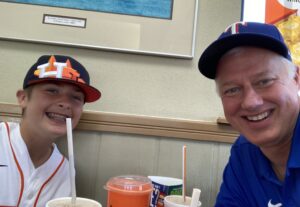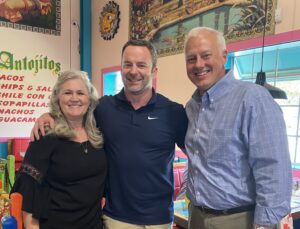 Tony Romo played ten years as quarterback for the Dallas Cowboys. Dak Prescott is in his tenth season. Romo’s record as a starter was 78-49. Today, Dak’s record is 78-49-1. Dak’s career passer rating is 98.3, while Romo’s is 97.1. They each have two Wild Card playoff victories and nothing more. The past ten years have been exactly like the ten years before that. Exactly. And it’s not either one of those quarterbacks’ fault.
Tony Romo played ten years as quarterback for the Dallas Cowboys. Dak Prescott is in his tenth season. Romo’s record as a starter was 78-49. Today, Dak’s record is 78-49-1. Dak’s career passer rating is 98.3, while Romo’s is 97.1. They each have two Wild Card playoff victories and nothing more. The past ten years have been exactly like the ten years before that. Exactly. And it’s not either one of those quarterbacks’ fault.
~~~~~~~~~~~~~~~~~~~~~~~~~~~
Jesus and the Jewish lawyer are debating God’s great command. The expert in the Scriptures tells Jesus the greatest command is “Love the Lord your God with all your heart and with all your soul and with all your strength and with all your mind and love your neighbor as yourself” (Luke 10:27). Jesus tells him he has answered correctly. The Greek word is orthos, as in orthodox. You have not only given the correct answer, Jesus is saying, you have given the only answer! Do this and you will live.
“And who is my neighbor?”
See, obeying this commandment is either going to be easy or hard depending on who my neighbor is. I’m either going to do this or not, depending on who we’re talking about. So, let’s define the terms. Who is my neighbor?
Luke tells us he’s wanting to justify himself. This biblical scholar wants to limit the scope of neighbor so he can say in front of this crowd following Jesus, “I’m doing it. I’m obeying that command.”
This religious leader is trying to create a distinction. The very question he asks suggests that some people are neighbors and some are not, so we’re required by God to love some people, but not all people. The question implies that God’s people are only called to love God’s people, and that we get to decide who God’s people are. The guy is saying some people are neighbors and some people are not neighbors based on geography or race or language or culture or skin color or citizenship status or socio-economic factors or something–some people are non-neighbors and God’s great command to love does not apply to them.
That’s what the expert in the Scriptures is saying. That’s what Jesus is responding to when he tells his story.
A man has been robbed. He has been attacked, stripped, beaten, and left for dead. A priest walks up and “saw” this victim, but he “passed” on the other side of the road and did nothing. A Levite happens up and also “saw” this man and also “passed” on the other side. He did nothing. Two religious leaders who’ve known and taught the command to love God and love neighbor for as long as they can remember–they “saw” and “passed.”
Then a Samaritan walks up and “saw” and “went” to the man. These verbs are important. Jesus says the Samaritan “saw” the man and he “went” to the man. He took care of the man’s wounds, he took the man to an inn, he paid for the man’s medical care, and promised to return and repay whatever was necessary.
Then, Jesus says, “Now, you define neighbor for me. Who’s the neighbor?”
Well, obviously, the one who showed mercy and acted in compassion and love.
And our Lord looks this expert right in the eye and gives him two more verbs: “Go and do likewise.”
Jesus is making his point crystal clear: Instead of worrying if someone’s my neighbor or not, Jesus says make sure you’re a neighbor!
Our job is never to evaluate the worthiness of others or to judge people as to whether they deserve compassion and love. Our job as children of God and followers of Christ is to demonstrate compassion and love It’s too make sure I’m being a neighbor and you’re being a neighbor to every person you see every day.
No more conversations or debates. No more questions and answers. No more religious loopholes, religious line-drawing, or religious double-talk. No more using God or the Word of God as a way to avoid or dismiss the very real hurting men and women we see all around us.
When we understand the story, we understand that something big is going on and I’m told I can get in on it. Actually, I’m told, “Go! Get in on it!”
Peace,
Allan






Recent Comments